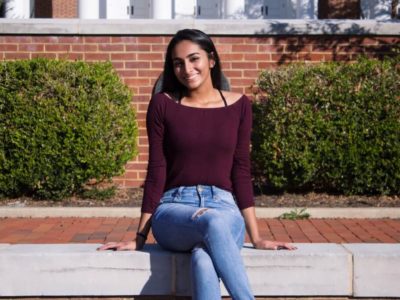Family friends’ houses, religious functions, sporting events, grocery stores—you name the place and I guarantee someone asked my parents this question about my future by some curious, well-meaning acquaintance.
“So… doctor or engineer?”
Although my parents respond to such blunt inquiries with ease and calm composures, questions like these stung as I narrowed down my options. Ultimately I decided to pursue a bachelor’s in multi-platform journalism. And my parents not only supported me, but they also seemed thrilled to see that I found an apt major for my skillset.
As a young child, I quickly became an avid reader and writer, picking up chapter books before my peers and filling diaries and journals with mindless, plot-less fairy tales. These stories now sit in my attic as a manifestation of my love for story-telling, which only grew with time. This intense passion for reading, writing and editing carried forward throughout my middle and into high school years. I soon began to realize that, as cheesy as it may be, I really wanted to change the world with words.
Despite figuring out my passion for writing at a very young age, I only recently realized how well journalism would work for me. What intrigued me most about journalism was the need to keep up with the latest news, work in fast-paced environments, write with creativity and eloquence and most importantly, maintain the integrity of news conveyance.
And I chose the University of Maryland College Park, known for offering a top journalism program. I could not wait to settle in, take classes and find my place on campus. The diverse makeup of students, which resembled my high school population on a larger scale, intrigued me most. I couldn’t put into words how content I was and am with my choice. But I know for sure I felt disappointed to walk into three different journalism courses during the first week of the semester and find myself as one of two Indian-American students in any of them.
The disappointment didn’t come as a surprise, though. As an Indian-American who grew up in a diverse but competitive school environment, I noticed early on that my decision to choose a non-STEM major would attract attention. Neighbors and family friends displayed an expression that became all too familiar: a blend of raised eyebrows and a look of confusion, disinterest or plain surprise.
What I could not and still cannot understand is why a stigma exists in the Indian culture against pursuing a path that does not revolve around math or science. Why does my choice of major scream “lack of intelligence”? I chose to study what I feel passionately about.
What did shock me was the ignorance of some of my peers, both in high school and in college. Some expressed support and pride for my decision to pursue my passion. Others surprised me by reflecting the skeptical thoughts and mindsets of their Indian-American parents. Once I mentioned journalism, I would watch with dismay and mild irritation as some receivers would switch their attention to the next person without even following up on why I’m doing what I’m doing.
So walking into those classes was definitely unexciting, but not necessarily off-putting. Not seeing other Indian-American journalism majors simply made me feel as though I’d lost my sense of familiarity.
But I later thought more about it and realized that this only leaves room for a new perspective. This allows me to write through a lens that isn’t always visible to others. I can still attempt to change the world with my writing, even if there aren’t as many students who can directly relate to my personal lifestyle or obstacles. I suppose that makes it all the more interesting.
College provides you with an atmosphere to meet the most incredible and intelligent individuals—people of all different backgrounds, ethnicities and stories. In all honesty, I don’t know if my roots provide me with an advantage or disadvantage because I don’t know if my personal experiences will necessarily reflect a sense of uniqueness and creativity.
I do know, however, that despite walking into a room of students from diverse backgrounds and feeling slightly underrepresented, all I can do is try and use my silly anecdotes for something great. Maybe I’ll find the people who want to forever change the stigma against non-STEM studies for Indian-Americans here, maybe I won’t. It doesn’t make sense to quit trying before I start, right?



















